主语补足语形式种种
- 格式:doc
- 大小:26.50 KB
- 文档页数:1
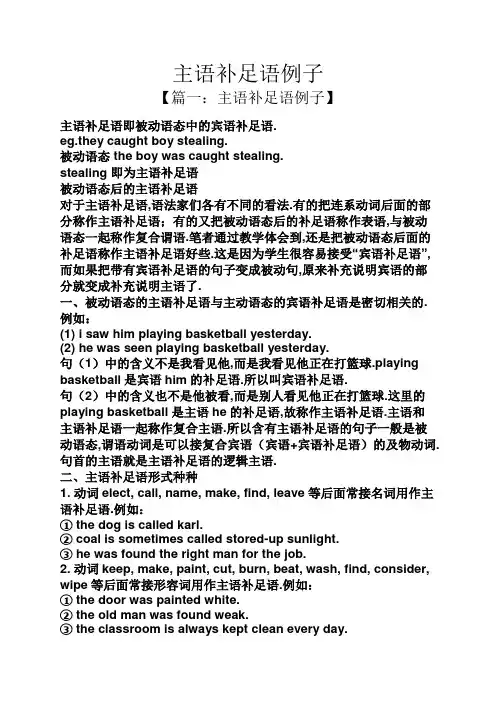
主语补足语例子【篇一:主语补足语例子】主语补足语即被动语态中的宾语补足语.eg.they caught boy stealing.被动语态 the boy was caught stealing.stealing 即为主语补足语被动语态后的主语补足语对于主语补足语,语法家们各有不同的看法.有的把连系动词后面的部分称作主语补足语;有的又把被动语态后的补足语称作表语,与被动语态一起称作复合谓语.笔者通过教学体会到,还是把被动语态后面的补足语称作主语补足语好些.这是因为学生很容易接受“宾语补足语”,而如果把带有宾语补足语的句子变成被动句,原来补充说明宾语的部分就变成补充说明主语了.一、被动语态的主语补足语与主动语态的宾语补足语是密切相关的.例如:(1) i saw him playing basketball yesterday.(2) he was seen playing basketball yesterday.句(1)中的含义不是我看见他,而是我看见他正在打篮球.playing basketball是宾语him的补足语.所以叫宾语补足语.句(2)中的含义也不是他被看,而是别人看见他正在打篮球.这里的playing basketball是主语he的补足语,故称作主语补足语.主语和主语补足语一起称作复合主语.所以含有主语补足语的句子一般是被动语态,谓语动词是可以接复合宾语(宾语+宾语补足语)的及物动词.句首的主语就是主语补足语的逻辑主语.二、主语补足语形式种种1. 动词elect, call, name, make, find, leave等后面常接名词用作主语补足语.例如:① the dog is called karl.② coal is sometimes called stored-up sunlight.③ he was found the right man for the job.2. 动词keep, make, paint, cut, burn, beat, wash, find, consider, wipe等后面常接形容词用作主语补足语.例如:① the door was painted white.② the old man was found weak.③ the classroom is always kept clean every day.3. 动词see, watch, hear, feel, listen to, look at, imagine等后面接分词用作主语补足语.例如:① he is often heard reading english.② the professor was seen making an experiment in the chemistry lab.③ the glass was found broken.④ the classroom was found crowded with people.4.感官动词see, watch, hear, notice, feel, make等后面接带to的不定式用作主语补足语.例如:① he was seen to come upstairs.② ice is known to be in a solid state.③ the spy was ordered to be hanged.5. 介词短语用作主语补足语.例如:① the books in the study must be kept in good order.② he was found in good health.③ english is considered of great importance for us.6. as后面接名词、形容词、分词等用作主语补足语.例如:① english is taken as a useful means for research work.② the news is considered as true.③ the stool is usually thought as having four legs④ the vase is thought as broken.7. 由what引导的名词性从句用作主语补足语.例如:the boy has been made what he is.三、主语补足语的判别1.看句中的动词是不是可接复合宾语,而且是不是被动语态,与此同时还要看其后部分的逻辑主语是不是句子的主语.2. 另一种最简单的方法是:如果还不能看出来就可以把全句改成主动语态,加上一个主语we或people等.改成主动语态后,看后面是不是变成了“宾语+宾语补足语”了,这样我们就可以判别原句后面是不是主语补足语.例如:被动句:she was found reading in the library. (主语补足语)主动句:we found her reading in the library. (宾语+宾语补足语)被动语态一、被动语态的用法:1. 一般现在时的被动语态构成:is / am / are + 及物动词的过去分词our classroom is cleaned everyday.i am asked to study hard.knives are used for cutting things.2. 一般过去时的被动语态构成:was / were + 及物动词的过去分词a new shop was built last year.dinosaur eggs were laid long long ago.3. 现在完成时的被动语态构成:has / have + been + 及物动词的过去分词this book has been translated into many languages.many man-made satellites have been sent up into space by many countries.4. 一般将来时的被动语态构成:will+ be + 及物动词的过去分词a new hospital will be built in our city.many more trees will be planted next year.5. 含有情态动词的被动语态构成:情态动词+ be + 及物动词的过去分词young trees must be watered often.your mistakes should be corrected right now.the door may be locked inside.your homework can be handed in tomorrow.6. 现在进行时的被动语态构成:am / is / are + being + 及物动词的过去分词uncle wang is mending my bike now.→my bike is being repaired by tom now.they are planting trees over there. →trees are being planted over there by them.7. 不定式的被动语态:to + be + 及物动词的过去分词there are two books to be read. →there are twenty more trees to be planted.二、怎样把主动语态改成被动语态?把主动语态改为被动语态非常简单,可以遵循以下几个步骤:1. 先找出谓语动词;2. 再找出谓语动词后的宾语;3. 把宾语用作被动语态中的主语;4. 注意人称、时态和数的变化.例:1. bruce writes a letter every week. →a letter is written by bruce every week.2. li lei mended the broken bike this morning.→the broken bike was mended by li lei this morning.3. he has written two novels so far.→two novels have been written by him so far.4. they will plant ten trees tomorrow.→ten trees will be planted by them tomorrow.5. lucy is writing a letter now.→a letter is being written by lucy now.6. you must lock the door when you leave.→the door must be locked when you leave.三、使用被动语态应注意的几个问题:1. 不及物动词无被动语态.what will happen in 100 years.the dinosaurs disappeared about 65 million years ago.2. 有些动词用主动形式表示被动意义.this pen writes well.this new book sells well.3. 感官动词或使役动词使用省略to的动词不定式,主动语态中不带to ,但变为被动语态时,须加上to .例:make somebody do something→somebody+ be +made to do somethingsee somebody do something→somebody +be +seen to do somethinga girl saw my wallet drop when she passed by.→my wallet was seen to drop by a girl when she passed by.the boss made the little boy do heavy work.→the little boy was made to do heavy work by the boss.4. 如果是接双宾语的动词改为被动语态时,直接宾语(物)作主语,那么动词后要用介词,这个介词是由与其搭配的动词决定.he gave me a book.→a book was given to me by him.he showed me a ticket.→a ticket was shown to me by him.my father bought me a new bike. →a new bike was bought for me by my father.5. 一些动词短语用于被动语态时,动词短语应当看作一个整体,而不能丢掉其中的介词或副词.we can’t laugh him. →he can’t be laugh by us.he listens to the radio every day. →the radio is listened to by him every day.the nurse is taking care of the sick man. →the sick man is being taken care of by the nurse.补充:系动词连接了主语和补语.这种结构中的补语是说明主语性状的,所以称为主语补足语.系动词作为实义动词的一类,具有本身的意义,但是在起到桥梁作用的同时,有些系动词会保持本身具有的意义,有些意义则会减弱或消失.例如:1. i tasted the soup. ( taste 为及物动词,意思为“品尝”.)2. the soup tastes wonderful. (taste 为系动词,意思为“尝起来,吃起来”,意思基本未变.)3. he went to the cinema yesterday evening. ( go 是不及物动词,意思为“去,走”.)4. at the news, he went mad. (go为系动词,失去了“go”的原义,意为“变得”.)另外,英语中还有一定数量的不及物动词,完全保留了本身的词汇意义,同时又发挥着系动词的功能.它们与主语补足成分连用,所以这类词被称为“准系动词”(quasi-linking verb or half-linking verb).用于“s+vi+cs”(s代表主语,vi代表不及物动词,cs代表主语补足语)这一句式的动词都属于这种用法.有时,主语补足语不紧跟系动词,有可能被其它状语成分隔开.以“go”为例:5. at twenty-four, tom went half-bald. ( go 为系动词,失去原义.)6. after midnight, tom went home bored.( go 为准系动词,保留原义,但同时又连接主语“tom”和主补“bored”,“home”为副词,表示地点状语.)用于这一句式的补语可以为各种形式,如名词词组(np),形容词词组(ap),介词词组(pr.p),和分词短语(pp)等.现举例如下:type1: s + vi +cs (np)7. we parted the best friends.= we were the best friends when we parted.8. i stand before you today the representative of a family in grief.= i am the representative of a family in grief when i stand before you today.类似的动词包括: come (back), die, fall, go, leave 等.type2: s + vi +cs (ap)9. they were born poor, lived poor, and poor they died.= they were poor when they were born; they were poor when they lived; they were poor when they died.10. she married young.= she was young when she married.11. the morning dawned fresh and clear after the storm at night. = when the morning dawned after the storm at night, it was fresh and clear.类似的动词包括:arrive, come (back), dawn, fall, leave, lie, marry, return, sit, stand, turn out 等.type3: s + vi +cs (pr.p)12. the parcel arrived in good condition.= when the parcel arrived, it was in good condition.13. they separated with feelings alienation.= they had feelings alienation when they separated.类似的动词包括:come, die, fall, go, leave, lie, part, return, sit, stand等.type4: s + vi +cs (p.p)14. they stood listening to him.= they stood while they were listening to him.15. he came home convinced that she was telling the truth.= he came home and he was convinced that she was telling the truth.类似的动词包括:arrive, die, fall, go, leave, lie, return, sit 等.【篇二:主语补足语例子】主语补足语:在svc(主-动-补)结构中,谓语动词随后跟有主语补足语(又叫“表语”) e.g ann is a schoolgirl.该句中的schoolgirl 就是主语ann的补足语。

宾语补足语和主语补足语集团标准化小组:[VVOPPT-JOPP28-JPPTL98-LOPPNN]宾语补足语:?某些及物动词的宾语后面还需要有一个补足语,意思才完整,宾语和它的补足语构成复合宾语。
而复合宾语的第一部分通常由名词或代词充当,第二部分表示第一部分的名词或代词发出的动作或身份、特征等,称为宾语补足语。
?宾语补足语有以下几类。
?1.由动词不定式充当。
多数是带to的不定式,也有不带to 的不定式。
1).要求带to的不定式作宾语补足语的动词有tell,ask,invite,force,get,beg,allow,wish,want,like,prefer,intend,expect,encourage,a d v i s e,p e r m i t,o r d e r,w a r n,c a u s e等。
e g.?I would prefer you not to change your plan.? 我宁愿你不要改变计划。
?They encouraged me to try again.他们鼓励我再次尝试。
??2).某些动词如think,consider,believe,know,find 等后面作宾语补足语的不定式常用to be + adj.的结构。
?e g.? We believed him to be stupid.我们认为他很笨。
? He didn”t consider himself (to be) important.? 他并不认为自己重要。
??3).某些动词如make,have,let,see,hear,watch,notice,feel等后作宾语补足语的不定式不带to。
?e g.? He made us stay for tea.他使我们留下来吃茶点。
?Let me introduce you to Miss Li.让我介绍你和李小姐认识。
?D i d y o u n o t ic e m e le a v e/l e a v i n g t h e h o u s e? 你注意到我离开了(正在离开)那房子吗??4).变为被动语态时,不定式符号t o必须保留。
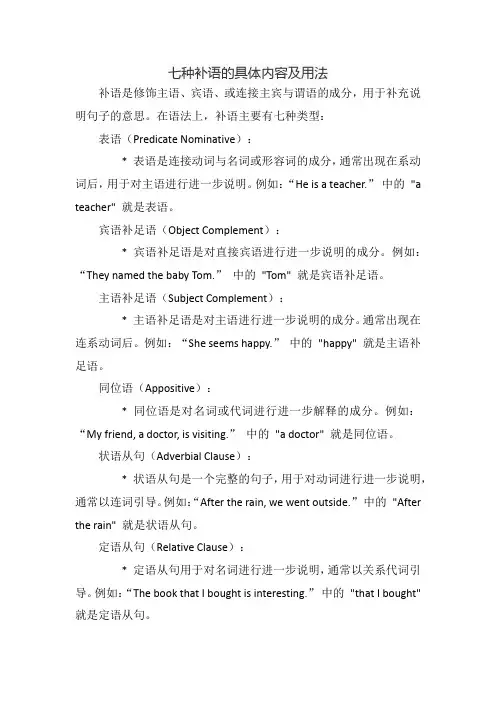
七种补语的具体内容及用法补语是修饰主语、宾语、或连接主宾与谓语的成分,用于补充说明句子的意思。
在语法上,补语主要有七种类型:表语(Predicate Nominative):* 表语是连接动词与名词或形容词的成分,通常出现在系动词后,用于对主语进行进一步说明。
例如:“He is a teacher.”中的"a teacher" 就是表语。
宾语补足语(Object Complement):* 宾语补足语是对直接宾语进行进一步说明的成分。
例如:“They named the baby Tom.”中的"Tom" 就是宾语补足语。
主语补足语(Subject Complement):* 主语补足语是对主语进行进一步说明的成分。
通常出现在连系动词后。
例如:“She seems happy.”中的"happy" 就是主语补足语。
同位语(Appositive):* 同位语是对名词或代词进行进一步解释的成分。
例如:“My friend, a doctor, is visiting.”中的"a doctor" 就是同位语。
状语从句(Adverbial Clause):* 状语从句是一个完整的句子,用于对动词进行进一步说明,通常以连词引导。
例如:“After the rain, we went outside.”中的"After the rain" 就是状语从句。
定语从句(Relative Clause):* 定语从句用于对名词进行进一步说明,通常以关系代词引导。
例如:“The book that I bought is interesting.”中的"that I bought" 就是定语从句。
形容词性补语(Adjective Complement):* 形容词性补语是对宾语或主语中的名词进行进一步说明的形容词。
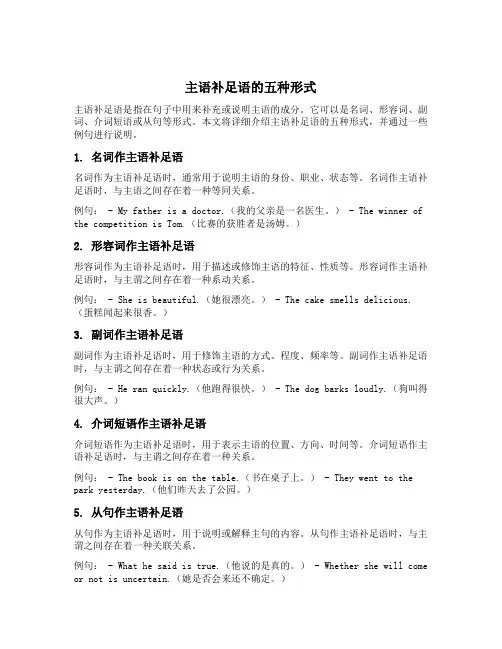
主语补足语的五种形式主语补足语是指在句子中用来补充或说明主语的成分。
它可以是名词、形容词、副词、介词短语或从句等形式。
本文将详细介绍主语补足语的五种形式,并通过一些例句进行说明。
1. 名词作主语补足语名词作为主语补足语时,通常用于说明主语的身份、职业、状态等。
名词作主语补足语时,与主语之间存在着一种等同关系。
例句: - My father is a doctor.(我的父亲是一名医生。
) - The winner of the competition is Tom.(比赛的获胜者是汤姆。
)2. 形容词作主语补足语形容词作为主语补足语时,用于描述或修饰主语的特征、性质等。
形容词作主语补足语时,与主谓之间存在着一种系动关系。
例句: - She is beautiful.(她很漂亮。
) - The cake smells delicious.(蛋糕闻起来很香。
)3. 副词作主语补足语副词作为主语补足语时,用于修饰主语的方式、程度、频率等。
副词作主语补足语时,与主谓之间存在着一种状态或行为关系。
例句: - He ran quickly.(他跑得很快。
) - The dog barks loudly.(狗叫得很大声。
)4. 介词短语作主语补足语介词短语作为主语补足语时,用于表示主语的位置、方向、时间等。
介词短语作主语补足语时,与主谓之间存在着一种关系。
例句: - The book is on the table.(书在桌子上。
) - They went to the park yesterday.(他们昨天去了公园。
)5. 从句作主语补足语从句作为主语补足语时,用于说明或解释主句的内容。
从句作主语补足语时,与主谓之间存在着一种关联关系。
例句: - What he said is true.(他说的是真的。
) - Whether she will come or not is uncertain.(她是否会来还不确定。
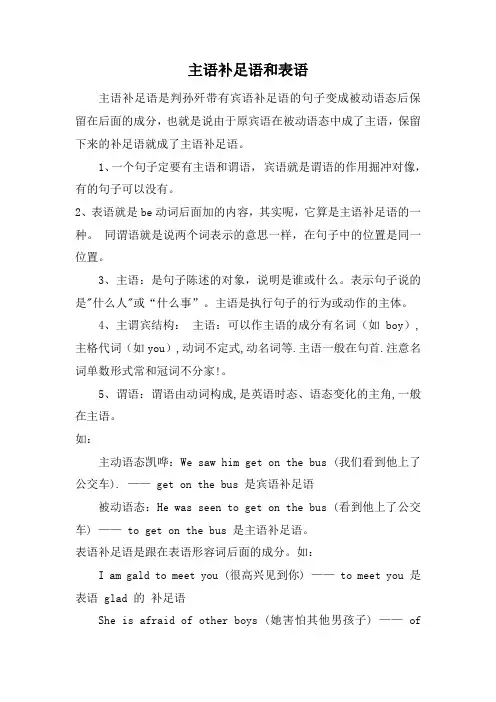
主语补足语和表语
主语补足语是判孙歼带有宾语补足语的句子变成被动语态后保留在后面的成分,也就是说由于原宾语在被动语态中成了主语,保留下来的补足语就成了主语补足语。
1、一个句子定要有主语和谓语,宾语就是谓语的作用掘冲对像,有的句子可以没有。
2、表语就是be动词后面加的内容,其实呢,它算是主语补足语的一种。
同谓语就是说两个词表示的意思一样,在句子中的位置是同一位置。
3、主语:是句子陈述的对象,说明是谁或什么。
表示句子说的是"什么人"或“什么事”。
主语是执行句子的行为或动作的主体。
4、主谓宾结构:主语:可以作主语的成分有名词(如boy),主格代词(如you),动词不定式,动名词等.主语一般在句首.注意名词单数形式常和冠词不分家!。
5、谓语:谓语由动词构成,是英语时态、语态变化的主角,一般在主语。
如:
主动语态凯哗:We saw him get on the bus (我们看到他上了公交车). —— get on the bus 是宾语补足语
被动语态:He was seen to get on the bus (看到他上了公交车) —— to get on the bus 是主语补足语。
表语补足语是跟在表语形容词后面的成分。
如:
I am gald to meet you (很高兴见到你) —— to meet you 是表语 glad 的补足语
She is afraid of other boys (她害怕其他男孩子) —— of
other boys 是表语 afraid 的补足语。
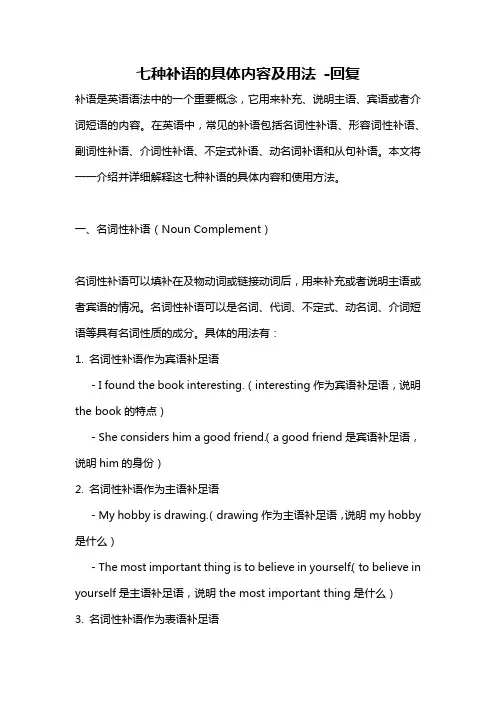
七种补语的具体内容及用法-回复补语是英语语法中的一个重要概念,它用来补充、说明主语、宾语或者介词短语的内容。
在英语中,常见的补语包括名词性补语、形容词性补语、副词性补语、介词性补语、不定式补语、动名词补语和从句补语。
本文将一一介绍并详细解释这七种补语的具体内容和使用方法。
一、名词性补语(Noun Complement)名词性补语可以填补在及物动词或链接动词后,用来补充或者说明主语或者宾语的情况。
名词性补语可以是名词、代词、不定式、动名词、介词短语等具有名词性质的成分。
具体的用法有:1. 名词性补语作为宾语补足语- I found the book interesting.(interesting作为宾语补足语,说明the book的特点)- She considers him a good friend.(a good friend是宾语补足语,说明him的身份)2. 名词性补语作为主语补足语- My hobby is drawing.(drawing作为主语补足语,说明my hobby 是什么)- The most important thing is to believe in yourself.(to believe in yourself是主语补足语,说明the most important thing是什么)3. 名词性补语作为表语补足语- She is a doctor.(a doctor作为表语补足语,说明she的身份)- The problem seems impossible to solve.(impossible to solve 作为表语补足语,说明the problem的状态)二、形容词性补语(Adjective Complement)形容词性补语用来补充、说明主语或者宾语的性质或者状态,常用来修饰名词。
具体的用法有:1. 形容词性补语作为链接动词的补语- He looks tired.(tired作为补语,说明主语he的状态)- She made him happy.(happy作为补语,说明宾语him的感受)2. 形容词性补语作为动词的宾语补足语- They chose her as their leader.(as their leader作为宾语补足语,说明her的身份)- We consider the plan feasible.(feasible作为宾语补足语,说明the plan的特性)三、副词性补语(Adverb Complement)副词性补语可以用副词或者副词短语的形式出现,用来修饰动词、形容词、副词或者整个句子的含义。
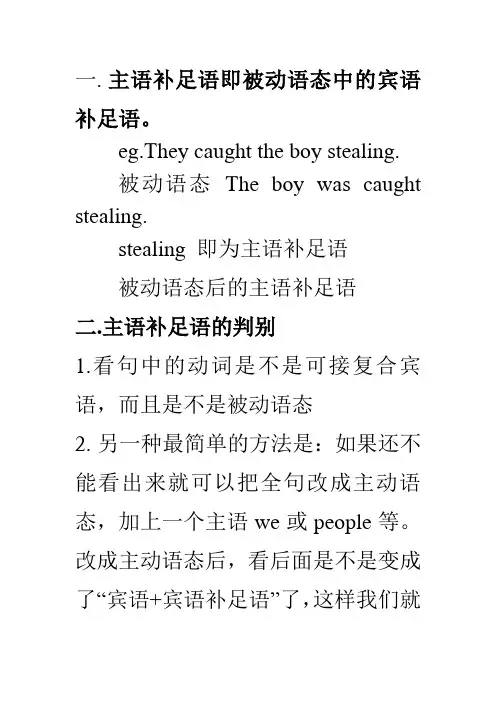
一.主语补足语即被动语态中的宾语补足语。
eg.They caught the boy stealing.被动语态The boy was caught stealing.stealing 即为主语补足语被动语态后的主语补足语二.主语补足语的判别1.看句中的动词是不是可接复合宾语,而且是不是被动语态2.另一种最简单的方法是:如果还不能看出来就可以把全句改成主动语态,加上一个主语we或people等。
改成主动语态后,看后面是不是变成了“宾语+宾语补足语”了,这样我们就可以判别原句后面是不是主语补足语。
e.g.被动句:She was found reading in the library. (主语补足语) 主动句:We found her reading in the library. (宾语+宾语补足语)三.主语补足语形式种种1. 动词elect, call, name, make, find, leave等后面常接名词用作主语补足语。
例如:① The dog is called Karl.②Coal is sometimes called stored-up sunlight. ③ He was found the right man for the job.2. 动词keep, make, paint, cut, burn, beat, wash, find, consider, wipe等后面常接形容词用作主语补足语。
例如:①The door was painted white. ②The old man was found weak. ③The classroom is always kept clean every day.3. 动词see, watch, hear, feel, listen to, look at, imagine等后面接分词用作主语补足语。
例如:①He is often heard reading English. ②The professor was seen making an experiment in the chemistry lab. ③The glass was found broken. ④ The classroom was found crowded with people.4.感官动词see, watch, hear, notice, feel, make等后面接带to的不定式用作主语补足语。
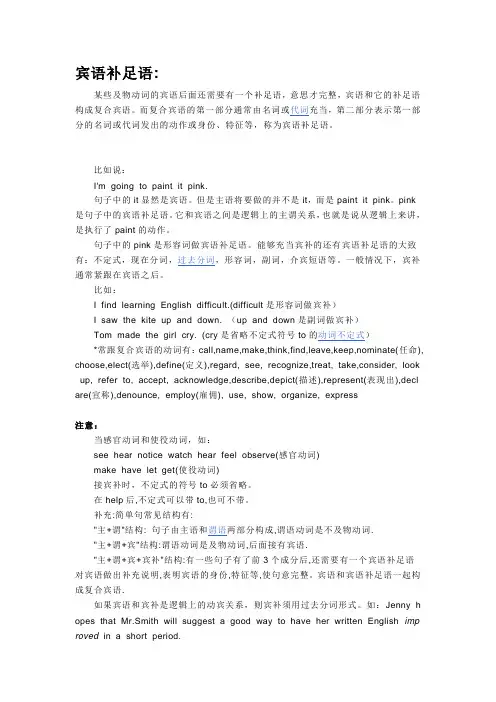
宾语补足语:某些及物动词的宾语后面还需要有一个补足语,意思才完整,宾语和它的补足语构成复合宾语。
而复合宾语的第一部分通常由名词或代词充当,第二部分表示第一部分的名词或代词发出的动作或身份、特征等,称为宾语补足语。
比如说:I'm going to paint it pink.句子中的it显然是宾语。
但是主语将要做的并不是it,而是paint it pink。
pink 是句子中的宾语补足语。
它和宾语之间是逻辑上的主谓关系,也就是说从逻辑上来讲,是执行了paint的动作。
句子中的pink是形容词做宾语补足语。
能够充当宾补的还有宾语补足语的大致有:不定式,现在分词,过去分词,形容词,副词,介宾短语等。
一般情况下,宾补通常紧跟在宾语之后。
比如:I find learning English difficult.(difficult是形容词做宾补)I saw the kite up and down. (up and down是副词做宾补)Tom made the girl cry. (cry是省略不定式符号to的动词不定式)*常跟复合宾语的动词有:call,name,make,think,find,leave,keep,nominate(任命), choose,elect(选举),define(定义),regard, see, recognize,treat, take,consider, look up, refer to, accept, acknowledge,describe,depict(描述),represent(表现出),decl are(宣称),denounce, employ(雇佣), use, show, organize, express注意:当感官动词和使役动词,如:see hear notice watch hear feel observe(感官动词)make have let get(使役动词)接宾补时,不定式的符号to必须省略。
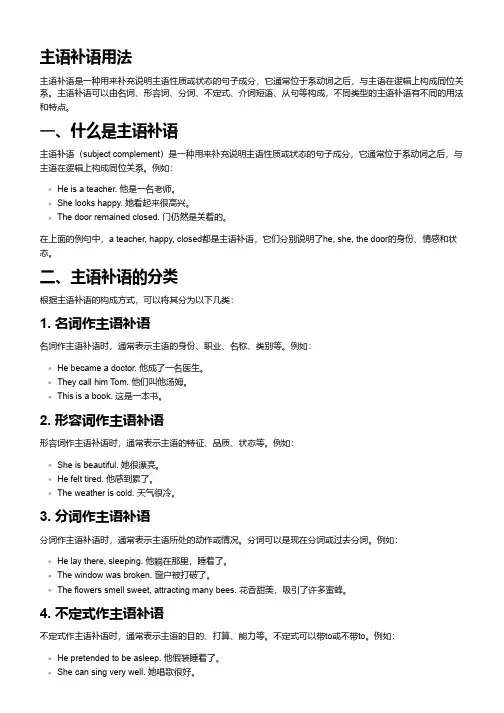
主语补语用法主语补语是一种用来补充说明主语性质或状态的句子成分,它通常位于系动词之后,与主语在逻辑上构成同位关系。
主语补语可以由名词、形容词、分词、不定式、介词短语、从句等构成,不同类型的主语补语有不同的用法和特点。
一、什么是主语补语主语补语(subject complement)是一种用来补充说明主语性质或状态的句子成分,它通常位于系动词之后,与主语在逻辑上构成同位关系。
例如:He is a teacher. 他是一名老师。
She looks happy. 她看起来很高兴。
The door remained closed. 门仍然是关着的。
在上面的例句中,a teacher, happy, closed都是主语补语,它们分别说明了he, she, the door的身份、情感和状态。
二、主语补语的分类根据主语补语的构成方式,可以将其分为以下几类:1. 名词作主语补语名词作主语补语时,通常表示主语的身份、职业、名称、类别等。
例如:He became a doctor. 他成了一名医生。
They call him Tom. 他们叫他汤姆。
This is a book. 这是一本书。
2. 形容词作主语补语形容词作主语补语时,通常表示主语的特征、品质、状态等。
例如:She is beautiful. 她很漂亮。
He felt tired. 他感到累了。
The weather is cold. 天气很冷。
3. 分词作主语补语分词作主语补语时,通常表示主语所处的动作或情况。
分词可以是现在分词或过去分词。
例如:He lay there, sleeping. 他躺在那里,睡着了。
The window was broken. 窗户被打破了。
The flowers smell sweet, attracting many bees. 花香甜美,吸引了许多蜜蜂。
4. 不定式作主语补语不定式作主语补语时,通常表示主语的目的、打算、能力等。
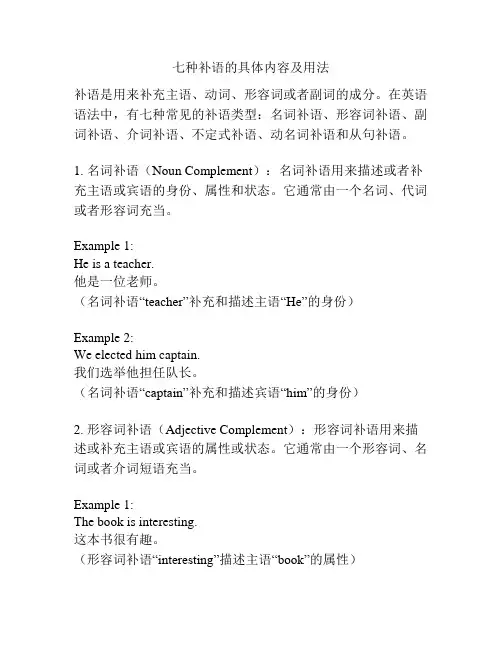
七种补语的具体内容及用法补语是用来补充主语、动词、形容词或者副词的成分。
在英语语法中,有七种常见的补语类型:名词补语、形容词补语、副词补语、介词补语、不定式补语、动名词补语和从句补语。
1. 名词补语(Noun Complement):名词补语用来描述或者补充主语或宾语的身份、属性和状态。
它通常由一个名词、代词或者形容词充当。
Example 1:He is a teacher.他是一位老师。
(名词补语“teacher”补充和描述主语“He”的身份)Example 2:We elected him captain.我们选举他担任队长。
(名词补语“captain”补充和描述宾语“him”的身份)2. 形容词补语(Adjective Complement):形容词补语用来描述或补充主语或宾语的属性或状态。
它通常由一个形容词、名词或者介词短语充当。
Example 1:The book is interesting.这本书很有趣。
(形容词补语“interesting”描述主语“book”的属性)I found him asleep.我发现他正在睡觉。
(形容词补语“asleep”描述宾语“him”的状态)3. 副词补语(Adverb Complement):副词补语用来描述或补充动词的动作或状态。
它通常由一个副词、介词短语或者名词短语充当。
Example 1:He walked away slowly.他慢慢地走开了。
(副词补语“slowly”描述动词“walked”的方式)Example 2:She held the baby tightly.她紧紧地抱着婴儿。
(副词补语“tightly”描述动词“held”的方式)4. 介词补语(Prepositional Complement):介词补语用来描述或补充动词、形容词或者名词的关系或位置。
它由一个介词短语充当。
Example 1:He is good at playing the piano.他擅长弹钢琴。
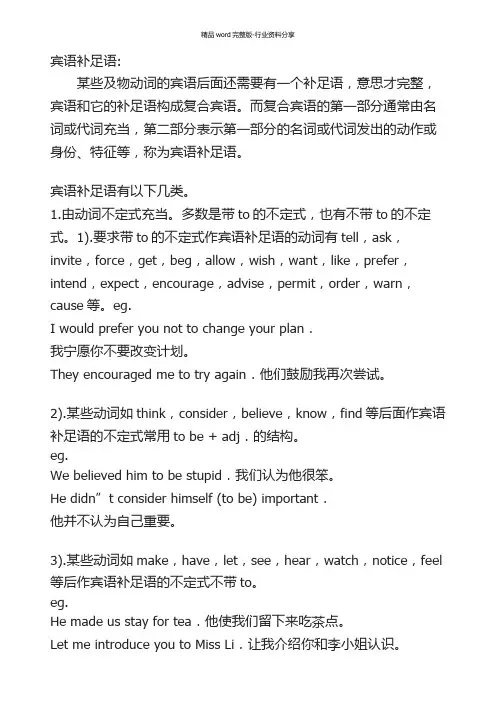
宾语补足语:某些及物动词的宾语后面还需要有一个补足语,意思才完整,宾语和它的补足语构成复合宾语。
而复合宾语的第一部分通常由名词或代词充当,第二部分表示第一部分的名词或代词发出的动作或身份、特征等,称为宾语补足语。
宾语补足语有以下几类。
1.由动词不定式充当。
多数是带to的不定式,也有不带to的不定式。
1).要求带to的不定式作宾语补足语的动词有tell,ask,invite,force,get,beg,allow,wish,want,like,prefer,intend,expect,encourage,advise,permit,order,warn,cause等。
eg.I would prefer you not to change your plan.我宁愿你不要改变计划。
They encouraged me to try again.他们鼓励我再次尝试。
2).某些动词如think,consider,believe,know,find等后面作宾语补足语的不定式常用to be + adj.的结构。
eg.We believed him to be stupid.我们认为他很笨。
He didn”t consider himself (to be) important.他并不认为自己重要。
3).某些动词如make,have,let,see,hear,watch,notice,feel 等后作宾语补足语的不定式不带to。
eg.He made us stay for tea.他使我们留下来吃茶点。
Let me introduce you to Miss Li.让我介绍你和李小姐认识。
Did you notice me leave/leaving the house你注意到我离开了(正在离开)那房子吗?4).变为被动语态时,不定式符号to必须保留。
eg.People who won”t work should be made to work.必须要不愿工作的人工作。
语法:主语补足语小结【卧龙雪痕】其中,形容词,名词、数词、不定式,分词,介词短语,从句可作主语补足语。
参考百度百科知识总结。
1. 动词elect, call, name, make, find, leave等后面常接【名词】用作主语补足语。
例如:①The dog is called Karl.②Coal is sometimes called stored-up sunlight.③He was found the right man for the job.2. 动词keep, make, paint, cut, burn, beat, wash, find, consider, wipe等后面常接【形容词】用作主语补足语。
例如:①The door was painted white.②The old man was found weak.③The classroom is always kept clean every day.3. 动词see, watch, hear, feel, listen to, look at, imagine等后面接【分词】用作主语补足语。
例如:①He is often heard reading English.②The professor was seen making an experiment in the chemistry lab.③The glass was found broken.④The classroom was found crowded with people.4.感官动词see, watch, hear, notice, feel, make等后面接带to的【不定式】用作主语补足语。
例如:①He was seen to come upstairs.②Ice is known to be in a solid state.③The spy was ordered to be hanged.5. 【介词短语】用作主语补足语。
四、解析非谓语动词作宾语补足语、主语补足语1.不定式作宾语、主语补足语。
如:The policeman told the boy not to play on the road.The old man was often seen to stand at the door of his house.解析:诸如get, ask, beg, invite, oblige, allow, hate, wish, want, expect, like, permit, encourage, request, advise, order, persuade, cause, warn等动词后都可用不定式作宾语补足语。
但hope, think, agree, insist, plan, suppose, suggest, announce, demand等动词不能这样用。
如果动词let, have, make, hear, notice, see, observe, feel, look at, listen to等,用于被动语态中时,则可以用不定式作主语补足语。
2.分词作宾语、主语补足语。
(1)现在分词作宾语、主语补足语。
如:Tom’s father saw him sitting on the eggs.Soon steam can be seen rising from the wet clothes.解析:现在分词作宾语、主语补足语时,表示现在分词的逻辑主语就是句子的宾语或主语,与逻辑主语之间存在主动关系。
(2)过去分词作宾语、主语补足语。
如:I had my house painted last week.Her book was found stolen when Kate came back home.解析:过去分词作宾语、主语补足语时,表示过去分词的逻辑主语就是句子的宾语或主语,与逻辑主语之间存在被动关系。
宾语补足语和主语补足语分类例解有些及物动词带了宾语后还需要有一个补足成分才能使句子完整,这个补足成分就叫做宾语补足语。
主要用来说明宾语的行为、特征、状态、身份等。
宾语和宾补一起构成复合宾语。
宾语和它的补足语在逻辑上有主语和谓语的关系,所以这样的宾语也叫做逻辑主语,它的补足语也叫逻辑谓语。
宾语补足语一般由名词、形容词、动词不定式、分词(现在分词和过去分词)、副词和介词短语等构成。
1. 在call, name, make, keep, elect, think, find, consider 等动词之后,常用名词作它的宾语补足语。
如:We call him Lao Wang. 我们叫他老王。
We must keep it a secret. 我们必须保密。
We found her a very suitable person for the job. 我们发现他很适合这项工作。
We consider Beijing the heart of our country. 我们认为北京是我国的心脏。
2. 在make, like, see, keep, get, find, leave, consider 等动词之后,常用形容词作它的宾语补足语。
如:We must keep the room clean. 我们必须保持房间干净。
I never saw him angry. 我从没见他生过气。
Who left the window open? 谁没关窗?We consider him too young to do the work. 我们认为他太年轻,干不了这项工作。
3. 动词不定式作宾语补足语时,视前面的动词分为带“to”和不带“to”两种情况。
(1)在ask, tell, want, wish, order, encourage 等动词之后,常用带“to”的动词不定式作宾语补足语。
如:The teacher asks us to read English in the morning. 老师让我们早晨读英语。
主语的补足语1.在“主语+谓语+宾语+宾语补足语”主动句中,变为被动句时,原来的宾语补足语就变为 主语补足语。
如:They elected Lincoln president of the USA(宾语补足语).Lincoln was elected president of the USA(主语补足语).2.一些词特别是形容词置于句子结尾表示一种结果或状态, 这时可以看做是主语的补语,补语 之前可以有逗号。
如:He died young.He came home sick.He arrived home, hungry.3.主语的补语有时放在主语的前面,用逗号隔开,这时可以看作是省略了 being的现在分词, 有人认为是状语。
如:(Being)Tired and sleepy, I went to bed.(Being ) nervous, the man opened the letter.= The man, nervous, opened the letter.= The man opened the letter, nervous.放在主语前面的词也可以置于主语的后面,用逗号隔开,这时可以看作是主语的同位语,意 义相当于非限制定语从句。
The man, (who was) nervous, opened the letter.All the people, young and old, should obey the law.4. 可用作主语补语的词语除形容词外,还有名词,数词,不定式,分词,介词短语,从句 等。
An orphan at six, he was brought up by a distant relative.Lincoln was born a poor farmer's boy and died President of the United States.He was seen to go upstairs.5. 有时用作主语补语的名词、代词、形容词、分词等之前可加上介词 as,而意义不变。
主语和主语补足语I. 充当主语的成分1. 名词:Our school is not far from my house.2. 代词:We like our school very much.3. 数词:Two plus two is four.4. 名词性或名词化的词、词组或短语:The mother with her child is coming to the school.5.动名词:Seeing is believing.6. 动词不定式:It would be exciting to watch the baseball games.7. 名词化的过去分词The disabled are to receive more money and social cares.8. 从句That he finished writing the composition in such a short time surprised us all.Whether we will go for an outing tomorrow remains unknown.It is certain that he will win the match.Ⅱ. 带有逻辑主语的主语The children’s wanting that surprised me.The children wanting that surprised me.Three such rascals hanged in one day is good work for society.For me to back out now would be to acknowledge that I am afraid.It is necessary for him to return the book immediately.Ⅲ. 状语形式作主语Between six and seven will suit me.Just over the bridge is where you’ll find it.Now will be the time.Outside is very quiet.Because Sally wants to leave doesn’t mean that we have to.Ⅳ. 主语+be+补语补语=表语补语表示确认意义(可以互换)Deborah is my best friend.My best friend is Deborah.What I need is a good computer.A good computer is what I need.My favorite sport is swimming.Swimming is my favorite sport.The purpose of the instruction is to make it easy for newcomers to find their way around the city.To make it easy for newcomers to find their way around the city is the purpose of the instruction.Two reasons for visiting New York are to see the statue of Liberty and to take pictures from the top of the Empire State Building.To see the statue of Liberty and to take pictures from the top of the Empire State Building are two reasons for visiting New York.表示特征意义(一般不能互换)Climbing hills is good exercise.This hat is the right sizeHis brother is a sailor.Ⅴ. 主语+补语How could you be so spiteful, and her your best friend?= seeing that she is your best friendThey left without a word, and he so sensitive.=They left without a word, though he was so sensitive.He has been acquitted, and no wonder.=He has been acquitted, and it was no wonder. Or=He has been acquitted, which is no wonder.Ⅵ. 量度形容词作主语补足语John is old.John is ten years old.⑴big, heavy, far, hot等形容词不能被量度名词短语修饰It’s 20 kilos in weight.≠ *20 kilos heavyThe village is five miles away. ≠ *five miles far⑵fast, slow, late等可以与量度名词短语使用My watch is five minutes fast.The train was ten minutes late.Ⅶ. 作补语的介词短语与进行体be + at + 名词= -ingHe is at work (=working) on a new invention.at play, at rest, etc.be + on + 名词= -ingThe thief was on trial (=being tired) for theft.on patrol, on strike, on holiday, on duty, on a journey, etc.be + under + 名词= -ingTwo new motor roads have recently been opened, and several others are under construction (=being constructed).under cultivation, under way, etc.be + in + 名词= -ingThe methods with which we are so familiar were not in use (=being used) in those days.in attendance on, in pursuit of, in motion, in progress, etc.Ⅷ. be + as / what 从句无差别He is not as/what he was ten years ago.有差别This is what I might. 从句中没有be固定习语Air is to us as/what water is to fish.Two is to three as/what four is to six.Reading is to the mind as/what food is to the body.Success is to joy as/what failure is to sadness.Ⅸ. 准主语补足语和准宾语补足语⑴准主语补足语特殊系动词描述主语现状arrive, float, go, hang, lie, ride, sit, stand, etc.George stood motionless as a wooden post.go, pass, emerge, escape, survive, etc. + 过去分词His remarks passed unnoticed.表示结果boil, fall, run, sink, wash, etc.The well ran dry.⑵准宾语补足语We don’t eat shrimps raw. (when they are raw).She pushed the door open.Exercises:1.__A__ find their way home still remains amystery to biologists.A.How pigeonsB.That pigeonsC.Since pigeonsD.Pigeons2._C___ Rudolf Diesel disappeared from aGerman ship bound for London is still unknown.A.ThisB.Even thoughC.HowD.That3._C___ efficiently depends on the manner inwhich the fuel oil is injected into its cylinder.A.A diesel engine worksB.Since a diesel engineC.Whether a diesel engine worksD.Even though a diesel engine works4._A___ salmon find their way back to theirbirthplaces still remains a puzzle in nature.A.HowB.ThereC.Not thatD.That5._D___ pigeons can find their way home isbeyond dispute.A.There areB.It isC.HowD.That6._B___ the earth is round is a well-knownfact.A.SinceB.ThatC.WhetherD.This7._D___ the universe resulted from a hugeexplosion known as the “Big Bang”is widely accepted among astronomers in the world.A.HowB.WhenC.WhetherD.That8._A___ some precious stones can keep evilsaway and bring about good fortune is a deeply rooted belief among the Chinese people.A.WhyB.HowC.There areD.That9.In 1857, Elizabeth Blackwell establishedthe first hospital for women and children which later became ____ is now the New York Infirmary for Women Children.A.whatB.thatC.whereD.when10.The main reason architects are buildingmore and more skyscrapers is ____ the building space becoming increasingly limited.A.becauseB.whenC.thatD.where11.One of the advantages of the photovoltaiccell is because it provides a clean source of energy directly from the sun.12.“Did Mary enjoy her trip on the oceanliner?”“No, she stayed in her cabin while the ship was ____.”A.to seaB.over the seaC.in the seaD.at sea13.“I like your flower garden very much.”“Thank you, everything is ____ bloom now,”A.inB.byC.onD.at14.Cotton production has been ____ thedecline these years.A.downB.onC.atD.under15.The survival of civilization as we know itis ____ threat.A.withinB.underC.towardsD.upon16.What he said just now had little to dowith the question ____ discussion.A.onB.inC.underD.at17.The reason I didn’t go to France was ____a new job.A.because I gotB.because of gettingC.due toD.that I got18.Output is now six times ____ it wasbefore 1990.A.thatB.whatC.that whichD.of that19.Water will continue to be ____ it is today—next in importance to oxygen.A.howB.whichC.asD.what20.“What’s the matter with Harry?”“I don’tknow, but he certainly looks ____ he’d lost his best friend.”A.thatB.so thatC.asD.as if21.Careful surveys have indicated that asmany as 50 percent of patients do not take drugs ____ indicated.A.likeB.soC.whichD.as22.____ men have learned much from thebehavior of animals is hardly new.A.WhatB.ThoseC.ThatD.Whether23.____ is the center of our planetary systemwas a difficult concept to grasp in the Middle Age.A.It is the sun and not the earthB.Being the sun and not the earthC.The sun and not the earthD.That the sun and not the earth24.They lost their way in the forest, and____ made matters worse was that night began to fall.A.thatB.itC.whatD.which25. A man cannot be really happy if that heenjoys doing is ignored by society as of no value or importance.26.That his explanation comes to is that wecan expect no further help from him.27.Contrary to that I had expected, themeeting failed to adopt either of the proposals.28.Paul never told us why was he absentfrom the meeting yesterday, did he?29.Many years ago, churches were protectedby the belief that who stole from a sacred place would go to hell.30.If I knew his address, I ____ to him.A.can writeB.could writeC.could have writtenD.had written2006年英语专业四级语法真题31.__D__ dull he may be, he is certainly avery successful top executive.A.AlthoughB.WhateverC.AsD.However32.If only I __B__ play the guitar as well asyou!A.wouldB.couldC.shouldD.might33.The party, __D__ I was the guest of honor,was extremely enjoyable.A.by whichB.for whichC.to whichD.at which34.It’s high time we __B__ cutting down therainforests.A.stoppedB.had to stopC.shall stopD.stop35.The student said there were a few pointsin the essay he __C_ impossible to comprehend.A.has foundB.was findingC.had foundD.would find36.Loudspeakers were fixed in the hall sothat everyone __D__ an opportunity to the speech.A.ought to haveB.must haveC.may haveD.should have37.I am surprised __A__ this city is a dullplace to live in.A.that you should thinkB.by what you are thinkingC.that you would thinkD.with what you were thinking38.Susan is very hardworking, but her pay isnot __B__ for her work.A.enough goodB.good enoughC.as good enoughD.good as enough39.It is imperative that the government__C__ more investment into the shipbuilding industry.A.attractsB.shall attractC.attractD.has to attractnd belongs to the city; there is __D__thing as private ownership of land.A.no such aB.not suchC.not such aD.no such41.My daughter has walked eight miles today.We never guessed that she could walk __C__ far.A./B.suchC.thatD.as42.The statistics __D__ that living standardsin the area have improved drastically in recent times.A.provesB.is provingC.are provingD.prove43.There are only ten apples left in thebaskets, __A__ the spoilt ones.A.not countingB.not to countC.don’t countD.having not counted44.It was __C__ we had hoped.A.more a success thanB.a success more thanC.as much of a success asD.a success as much as45.There used to be a petrol station near thepark, __D__?A.didn’t itB.doesn’t thereedn’t itD.didn’t there46.It is an offence to show __D__ againstpeople of different races.A.distinctionB.differenceC.separationD.discrimination47. A great amount of work has gone into_B___ the Cathedral to its previoussplendor.A.refreshingB.restoringC.renovatingD.renewing48.The thieves fled with the local policeclose on their _D___.A.backsB.necksC.toesD.heels49.The economic recession has meant thatjob __A__ is a rare thing.A.securityB.safetyC.protectionD.secureness50.Many people nowadays save money to___C_ for their old age.A.caterB.supplyC.provideD.equip51.The tone of the article __B__ the writer’smood at the time.A.reproducedB.reflectedC.imaginedD.imitated52.This is not the right __A__ to ask for myhelp; I am far too busy even to listen.A.momentB.situationC.movementD.circumstance53.The job of a student accommodationofficer __D__ a great many visits to landladies.A.concernsB.offersC.asksD.involves54.Out family doctor’s clinic __B__ at thejunction of two busy roads.A.restsB.standsC.staysD.seats55.She was so fat that she could only just___C_ though the door.A.assembleB.appearC.squeezeD.gather56.After the heavy rain, a builder was calledto repair the roof, which was __A__.A.leakingB.tricklingC.droppingD.declining57.The reception was attended by __C__members of the local community.A.excellentB.conspicuousC.prominentD.noticeable58.Share prices on the Stock Exchangeplunged sharply in the morning but __B__ slightly in the afternoon.A.regainedB.recoveredC.restoredD.revived59.His __D__ brain has worked away on theidea of universal cure.A.richB.quickC.productiveD.fertile60.The couple has donated a not __A__amount of money to the foundation.A.inconsiderableB.inconsiderateC.inaccurateD.incomparable。
主语补足语形式种种
1. 动词elect, call, name, make, find, leave等后面常接名词用作主语补足语。
例如:
① The dog is called Karl.
② Coal is sometimes called stored-up sunlight.
③ He was found the right man for the job.
2. 动词keep, make, paint, cut, burn, beat, wash, find, consider, wipe等后面常接形容词用作主语补足语。
例如:
① The door was painted white.
② The old man was found weak.
③ The classroom is always kept clean every day.
3. 动词see, watch, hear, feel, listen to, look at, imagine等后面接分词用作主语补足语。
例如:
① He is often heard reading English.
② The professor was seen making an experiment in the chemistry lab.
③ The glass was found broken.
④ The classroom was found crowded with people.
4.感官动词see, watch, hear, notice, feel, make等后面接带to的不定式用作主语补足语。
例如:
① He was seen to come upstairs.
② Ice is known to be in a solid state.
③ The spy was ordered to be hanged.
5. 介词短语用作主语补足语。
例如:
① The books in the study must be kept in good order.
② He was found in good health.
③ English is considered of great importance for us.
6. as后面接名词、形容词、分词等用作主语补足语。
例如:
① English is taken as a useful means for research work.
② The news is considered as true.
③ The stool is usually thought as having four legs
④ The vase is thought as broken.
7. 由what引导的名词性从句用作主语补足语。
例如:
The boy has been made what he is.。